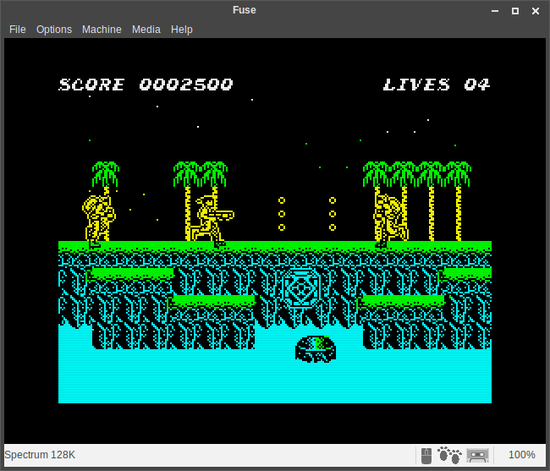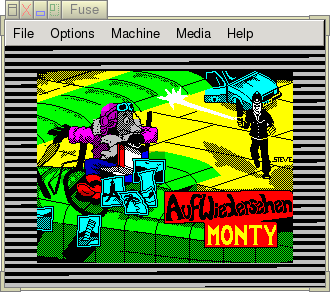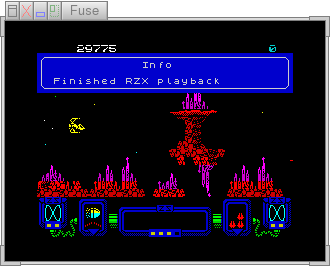- Fuse zx spectrum emulator linux
- Установка
- Установка в Ubuntu (LinuxMint)
- Игра кроссплатформенная Работает в:
- Сайт (скачать бесплатно):
- Обзоры игры от пользователей
- Fuse — the Free Unix Spectrum Emulator
- What is it?
- What features does it have?
- What is it lacking?
- Downloads
- macOS
- Windows
- Android
- Haiku
- AmigaOS 4
- MorphOS
- Gizmondo
- OpenDingux
- PocketPC
- RetroFW
- Windows Mobile Smartphone
- Source
- Installing Fuse
- Requirements
- What’s new?
- Development
- Are there any related projects?
- Fuse — Эмулятор ZX Spectrum
- Загрузит эмулятор на сайте разработчика:
Fuse zx spectrum emulator linux
Fuse — эмулятор Sinclair ZX Spectrum — легендарного персонального компьютера 80-90-х годов.
Установка
Установка в Ubuntu (LinuxMint)
Игра кроссплатформенная
Работает в:
- Android
- Linux
- MacOS
- Windows
Сайт (скачать бесплатно):
Обзоры игры от пользователей
Fuse — эмулятор Sinclair ZX Spectrum — легендарного персонального компьютера 80-90-х годов. Он умеет запускать программы и игры, разработанные для моделей 16K, 48K, 128K, линейки +2/+3 и многих других. Одна из интересных особенностей программы — использование ускоренной загрузки, что будет весьма кстати при запуске игр на кассетах.
Fuse использует библиотеку libspectrum, благодаря которой работает с самыми разными образами: .dsk, .udi, .fdi-образами дисков и картриджей, .tap и .tzx-кассетами и многими другими. При этом он не только считывает информацию, но и позволяет записывать данные на подходящие для этого типы носителей. В настройках программы вы можете указать необходимую скорость эмуляции, выбрать модель компьютера, отрегулировать вывод звука и видео (в том числе применить к видео графические фильтры, вроде SuperEagle, TV или Dot Matrix), переназначить управление и многое другое. Не забудьте сохранить изменения. Fuse умеет эмулировать и некоторое дополнительное оборудование, например принтер, джойстик и мышь. Он может сохранить состояние в файл, записать все происходящее на экране или просто сделать скриншот. Если нужно, в пункте меню «Help» разработчики предусмотрели подсказку в виде схемы раскладки клавиатуры.
Эмулятор можно бесплатно скачать и запустить почти на всех известных операционных системах. Исходный код Fuse распространяется согласно лицензии GPL2. Интерфейс эмулятора — на английском. В Ubuntu/Linux Mint программу можно установить воспользовавшись терминалом:
sudo apt-get install fuse-emulator-gtk
В репозитории так же есть SDL-версия и необязательный набор дополнительных утилит, в основном для работы с образами.
Для запуска программ и игр, Fuse потребуются оригинальные образы ПЗУ ZX Spectrum. Большинство из них вы найдете в отдельном пакете spectrum-roms. Сам пакет можно не устанавливать, просто скопируйте из него 48.rom, 128-0.rom, 128-1.rom и остальные в любой удобный вам каталог. При выводе предупреждения об отсутствующих ромах укажите к ним путь.
Несмотря на отмеченные выше ускоренную загрузку и графические фильтры, которые совершенно точно идут ему в плюс, Fuse все же эмулятор компьютера, пусть и восьмибитного, а потому — довольно сложный. Будьте готовы потратить чуть больше времени на освоение и настройку, и чуть меньше — на игры.
Источник
Fuse — the Free Unix Spectrum Emulator
What is it?
Fuse (the Free Unix Spectrum Emulator) was originally, and somewhat unsurprisingly, a ZX Spectrum emulator for Unix. However, it has now also been ported to Mac OS X, which may or may not count as a Unix variant depending on your advocacy position. It has also been ported to Windows, the Wii, AmigaOS and MorphOS, which are definitely not Unix variants.
What features does it have?
What is it lacking?
- Quite a lot! However, it’s a lot better than it used to be.
Downloads
Fuse is licensed under the GNU General Public License, version 2 or later. Please read this before downloading Fuse if you’re not already familiar with it.
Packages are available for some Unix distributions; in general, any problems which are specific to the packages should be sent to the package maintainer.
- The most recent version of Fuse is always available on Flathub for Linux users.
- Arch Linux users can get version 1.5.7 from AUR as a PKGBUILD.
- Official packages of 1.5.7 for Debian, maintained by Alberto Garcia, are available.
- Fedora has packages of 1.5.7 available by Lucian Langa.
- FreeBSD has a port of 1.5.7 available as emulators/fuse.
- Gentoo users have an ebuild of 1.5.7 available.
- NetBSD users can get version 1.5.7 from pkgsrc (the NetBSD Packages Collection) as emulators/fuse-emulator and emulators/fuse-emulator-utils.
- OpenBSD users have version 1.5.2 available as the fuse and fuse-utils package, with thanks to Anthony J. Bentley.
- openSUSE users have version 1.5.7 as the Fuse package from Emulators repository.
- The Polish Linux Distribution has packages of Fuse 1.5.7 and the utilities.
- Ubuntu has packages of 1.5.7 available by Alberto Garcia.
- Homebrew provides packages of 1.5.7 for macOS as «homebrew/games/fuse-emulator».
- Slackware users can get version 1.5.5 from SlackBuilds as a build script.
Packages of older versions of Fuse are also available for some other distributions:
- Nokia’s Maemo platform has a port of 1.0.0 available by Alberto Garcia.
macOS
A native port to macOS by Fredrick Meunier is available on its own SourceForge project here, as well as a Spotlight importer for Mac OS X 10.4 Tiger users. Alternatively, the original version of Fuse will compile on OS X 10.3 (Panther) or later.
Windows
A port to Windows of 1.6.0 by Sergio Baldoví is available here, and the utilities are available here.
Android
BogDan Vatra has ported Fuse 1.3.2 to Android OS, which could run on smartphones, tablets and TVs. Sources are available from GitHub and binaries from Google Play.
Haiku
Adrien Destugues has ported Fuse 1.5.6 to Haiku, available from haikuports as app-emulation/fuse and app-emulation/fuse-utils.
AmigaOS 4
Chris Young has ported Fuse 1.0.0.1 to AmigaOS 4, with binaries available from Aminet as misc/emu/fuse.lha.
MorphOS
Q-Master has ported Fuse 0.10.0.1 to MorphOS, with binaries available from AmiRUS.
Akop Karapetyan has ported Fuse to the PSP. Binaries and source, based on Fuse 0.10.0.1, are available from the Fuse PSP page.
A Wii port, based on work by Björn Giesler, is available from WiiBrew. This is based on what is essentially 0.10.0.2.
Gizmondo
A port of 0.9.0 to the Gizmondo tablet is available. The source was available via csie.org.
Ben O’Steen has made a GP2X port, based on Fuse 0.6. Binaries and source are available from his homepage.
Crabfists’s has made an Xbox port, based on Fuse 0.6. Binaries and source are available from the FuseX project at SourceForge.
OpenDingux
Pedro Luis Rodríguez González has made an OpenDingux port, based on Fuse 1.5.7. Binaries and source are available from GitHub.
PocketPC
Anders Holmberg’s ported Fuse 0.4 to the PocketPC as PocketClive.
RetroFW
Pedro Luis Rodríguez González has made a RetroFW port, based on Fuse 1.5.7. Binaries and source are available from GitHub.
Windows Mobile Smartphone
Keith Orbell’s then ported PocketClive to the Smartphone as FuseSP.
Source
Installing Fuse
Requirements
What’s new?
- Add TTX2000S emulation
- Experimental PulseAudio sound driver
- Fix activation of joystick and IF2 peripherals when loading a snapshot
- GTK/Win32: New higher resolution keyboard picture on GTK and win32 UIs
- GTK: Add Fuse icon to the about dialog and the main window
- GTK: Load/save binary dialog remembers last values
- GTK 3: Improve moving and sizing Fuse’s window under Wayland
- GTK 3: Fix kempston mouse values on Wayland
- GTK 3: Fix bug when resizing from 2x to 3x
- SDL: Fix crash when using dispmanx backend on the Raspberry Pi
- SDL: Allow forcing fullscreen mode when SDL doesn’t report available screen modes
- WidgetUI: New dialog to load/save binary data
- WidgetUI: Enable HOME and END keys in menus
- WidgetUI: Use monospaced characters on memory browser
- WidgetUI: Fix crash when trying to overwrite read-only files
- Xlib: Try to keep graphic filter when the user resize the window
- Fix display corruption with HQ 3x scaler
- Fix antialiasing effect of AdvMAME3x scaler
- Add 4x, TV 4x, Pal TV 4x and HQ 4x scalers on GTK, SDL, win32 and Xlib UIs
- Allow screenshots with TV 3x, PAL TV and Timex 1.5x scalers
- Various minor bugfixes
- GTK+ 3: Make the offset entry wider in memory browser
- GTK+: Remove duplicated surface creation code
- GTK+: Remove use of deprecated gtk_device_(un)grab functions
- GTK+/Win32: Add *.bin as an allowed filetype to file selectors and amend .fmf filetype
- Improve Fuse’s Kempston mouse handling under GTK+ 3.x
- «Save binary» command can now save 65536 bytes again (regression introduced in 1.5.6)
- Various minor bugfixes
- Z80 flags register is now correct after SCF and CCF
- «Variant» Alkatraz loaders (e.g. Gauntlet 3 and Shadow Dancer), «Variant» Search Loader programs (e.g. Lotus Esprit Turbo Challenge and Space Crusade) and Dinaload loaders (e.g. Astro Marine Corps) are now accelerated
- More improvements disabling phantom typist after finishing loading TAP or standard ROM TZX files
- Saving and loading binary data no longer increments tstate count or triggers breakpoints
- Stop RZX playback/recording on machine reset/change
- Various minor bugfixes
- Improve sound accuracy on Unix 64 bit systems
- Allow the use of real joystick hats/dpads in the SDL joystick code
- Various minor bugfixes
- Add *.FMF as an allowed filetype to file selectors
- Save SCR from current display file
- Use 44.1KHz as default sound frequency
- Upgrade to libspectrum 1.4.3 to fix TC2048 and TC2068 timings regression
- Various minor bugfixes
- Disable inactive peripherals after loading a snapshot
- Re-enable sound after phantom typist finishes loading TAP, standard ROM TZX or +3 DSK images
- Upgrade to libspectrum 1.4.2 to fix writing RZX files containing a snapshot which cannot be compressed
- Emulate ROM bug loading zero length blocks when using tape traps
- Fix the format of double-sided +3 disks
- Spectrum reset is accelerated when phantom typist is enabled and a file is loaded from the menu
- Add options UI for phantom typist
- GTK+ 3 UI: Memory browser dialog allows to go to specific offset
- Prevent crash when we try to disassemble an instruction with many DD or FD prefixes
- Fix crash when setting debugger variables
- Prevent crash when we try to profile an instruction with many DD or FD prefixes
- GTK+ UI: Improve behaviour of default button on dialogs
- GTK+ and win32 UIs: Support hex numbers in load/save binary and pokefinder dialogs
- SDL UI: Allow to select the video mode used in full-screen
- Autoload snapshots replaced by a «phantom typist» which types LOAD «» or similar
- Alkatraz loaders (e.g. Cobra and Fairlight) are now accelerated
- Debugger: Ensure conditional timed breakpoints work correctly
Development
If you just want news of new versions and the like, the (low volume) fuse-emulator-announce list is available. If you’re interested in the development of Fuse, this is coordinated via the fuse-emulator-devel list and the project page on SourceForge.
The latest version of Fuse is always available by checking out the ‘master’ branch from the git repository on SourceForge. Note that this isn’t guaranteed to compile, let alone work properly. Also, don’t expect any support for this version! (You’ll also need libspectrum from git; this is from the libspectrum repository). Similarly, the utilities are available in the fuse-utils repository.
One thing which isn’t in the SourceForge tracking system (and is now very outdated):
- David Gardner has produced a patch to give XVideo support for the Xlib UI, allowing arbitrary sized windows.
Are there any related projects?
- libspectrum is the library used by Fuse to handle various file formats.
- Mike Wynne’s ZX81 emulator, EightyOne is also using Fuse’s Z80 core.
- Matthew Westcott’s JSSpeccy uses a Z80 core based on translating Fuse’s core to Javascript.
- Alexander Shabarshin’s SPRINT, an emulator of the Peters Plus super-Speccy, the Sprinter. SPRINT is using Fuse’s Z80 core for its CPU emulation.
- z80ex, a Z80 emulation library based on Fuse’s Z80 core, used by zemu and PocketSpeccy.
Any comments, etc to Philip Kendall. This page was last updated on 1 March 2021 10:33:30 GMT.
Источник
Fuse — Эмулятор ZX Spectrum
Fuse — экскурсия в прошлое. Приложение, которое поможет вам вспомнить популярный ПК, выпускаемый в 80-90-х годах, названным ZX Spectrum. Главной особенностью данного приложения является тот факт, что с его помощью можно запустить игры, разработанные для практически каждой версии компьютера.

Библиотека libspectrum, используемая приложением, позволит запустить всевозможные образы картриджей. Библиотека предлагает возможность записи данных на носители, подходящие по формату. Быстрая загрузка — одна из главных особенностей приложения, которая будет полезна при запуске игр на кассетах.
В настройках приложения есть множество пунктов, делающих игру комфортной: выбор типа компьютера, настройка вывода графики и аудио составляющей игр, скорость эмуляции, графические фильтры. Кроме эмуляции игр, приложение может эмулировать оборудования, типа некоторых джойстика, принтера или мыши.
Благодаря кроссплатформенности, приложение можно запускать практически на любых операционных системах.
Загрузит эмулятор на сайте разработчика:
Чтобы установить приложение в систему Ubuntu/Mint, следует использовать команду:
Репозиторий содержит утилиты, необходимые для работы с образами, являющимися необязательными.
Чтобы запустить игры, их необходимо иметь под рукой. Для этого можно использовать пакет spectrum-roms, где вы найдете большинство популярных игр. Нет необходимости устанавливать пакет, достаточно скопировать из него 48.rоm, 128-0.rоm и оставшиеся в любой каталог. Перед запуском игр, следует указать путь к каталогу с образами.
Конечно, Fuse является не простым приложением, а эмулятором пусть и простого 8-ми битного компьютера, но достаточно сложного в понимании. Поэтому вам предстоит потратить немало времени на настройку приложения для правильной его работы, ну а потом поиграть в любимые игры из своего детства.
Источник






